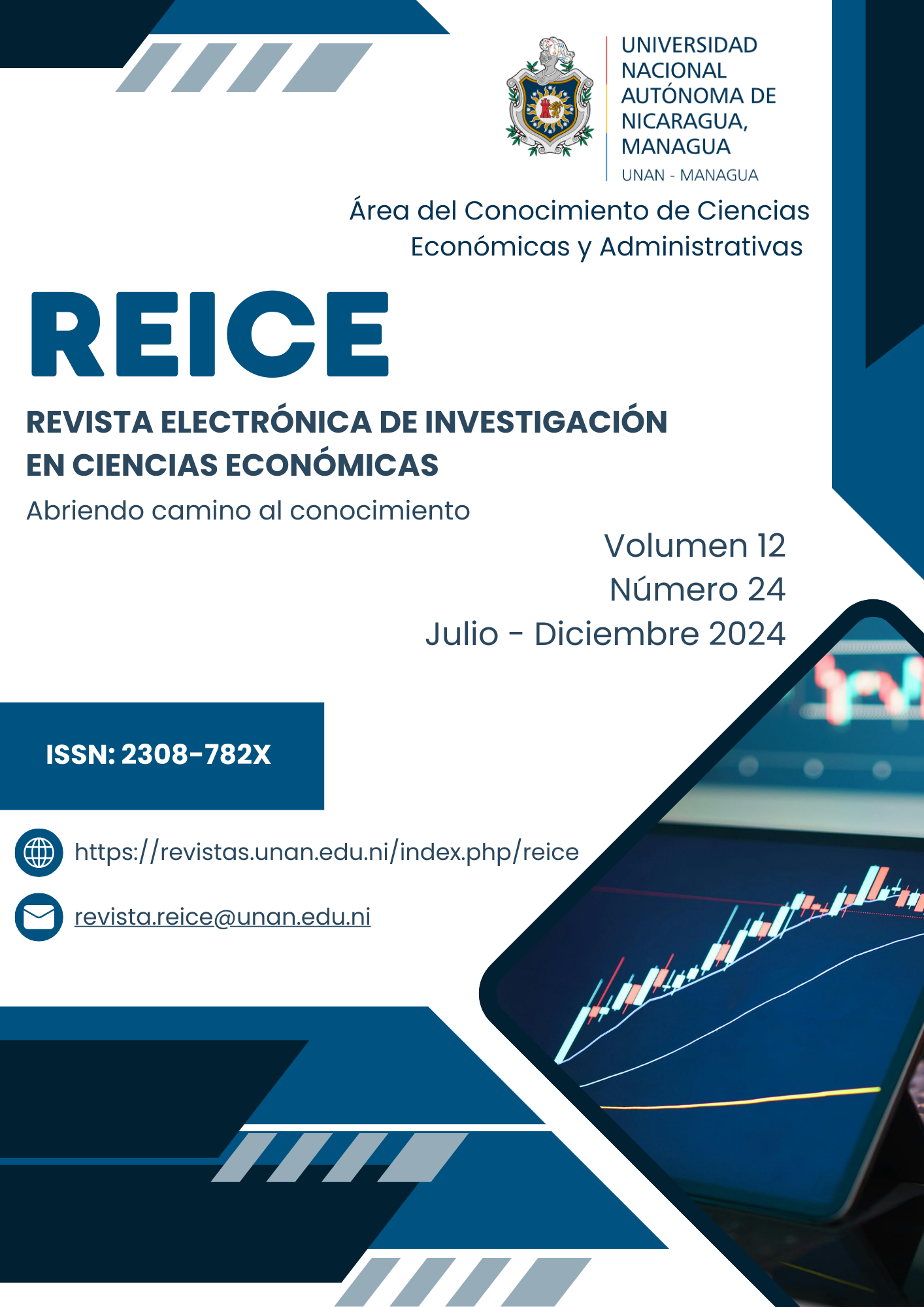Forecasting the economic dynamics of regional indicators affecting the Inclusive Development Index
DOI:
https://doi.org/10.5377/reice.v12i24.20060Keywords:
Inclusive growth, sustainable growth, development, socio-economic factors, inclusive development, Volga Federal District, concept, assessment, analysisAbstract
This article presents a correlation and regression analysis of GRP indicators, along with a forecast of the main factors contributing to the inclusive growth index of regions, using the Volga Federal District as an example. The aim of the article is to forecast key development indicators for the Volga Federal District within the framework of the inclusive development concept. The research methods include correlation-regression analysis, statistical analysis, mathematical modeling, graphical analysis, comparative analysis, and a bibliometric review. The author identifies significant factors affecting GRP and the relationships between them. The analysis highlights that per capita income and demographic load are the major factors significantly impacting GRP and inclusive growth. The study also features charts depicting the dynamics of key socio-economic development factors in the Volga Federal District over a five-year period, up to 2028.
Downloads
References
Akhmetshin, E., Klochko, E., Batirova, N., Vetrova, E., Andryushchenko, I., & Tolipova, B. (2023). The influence of organizational and economic mechanisms on the regulation of employment of young specialists. Journal of Management & Technology, 23, 352-363.
Bagratuni, K., Kashina, E., Kletskova, E., Kapustina, D., Ivashkin, M., Sinyukov, V., Karshalova, A., Hajiyev, H., & Hajiyev, E. (2023). Impact of socially responsible business behavior on implementing the principles of sustainable development (experience of large business). International Journal of Sustainable Development and Planning, 18(8), 2481-2488. https://doi.org/10.18280/ijsdp.180819
Beilin, I. L. (2023). Use of innovation potential and cluster organisation in the strategy of development of oil and gas regions. Industrial Economics/Russian Journal of Industrial Economics, 16(2), 213-225.
Burganov, R. T. (2021). Empirical assessment of the impact of digital transformation on the formation and development of an inclusive model of economic growth of the region. Theoretical and Applied Economics, 4, 105-118.
Burganov, R. T. (2022a). Empirical evaluation of the inclusive model of economic growth in the regions of the Volga Federal District. Kazan Economic Bulletin, 3(59), 71.
Burganov, R. T. (2022b). Features of the inclusive model of development of the regions of the Volga Federal District. Editor-in-Chief, 3.
Burganov, R. T. (2022c). Potential and prospects of the inclusive model of economic growth in the regions of the Volga Federal District. Reproduction potential of the region: problems of measuring the potential and competitiveness, 45-50.
Burganov, R. T. (2023). The study of inclusive economic growth in the regions of the Volga Federal District. Bulletin of the University of Management “TISBI”, 3, 5.
Burganov, R. T., Elshin, L. A., & Gafarov, M. R. (2022). Influence of scientific and technological development on the inclusive economic growth of the region (on the example of the Volga Federal District). Development of territories, 4(30), 24-33.
Eskerkhanova, L. T., Beloglazova, L. B., Masyutina, N. M., Romanishina, T. S., & Turishcheva, T. B. (2023). Increasing the competitiveness of future economists for work in industry 4.0. Perspektivy nauki i obrazovania – Perspectives of Science and Education, 62(2), 158-173. https://doi.org/10.32744/pse.2023.2.9
Federal Law No. 466-FZ. (December 5, 2022). On the Federal Budget for 2023 and for the planning period of 2024 and 2025 State Programme of the Russian Federation “Management of State Finances and Regulation of Financial Markets”.
Gafarov, M. R. (2021). Results of the study of inclusive development of the regions of the Volga Federal District. System transformation - the basis of sustainable innovative development, 145-149.
Gafarov, M. R., Safiullin, M. M. R., & Elshin, L. A. (2021). Formalised assessment of inclusive economic growth in the regions of the Volga Federal District. Modern Economy Success, 5, 142.
Kirillova, E., Otcheskiy, I., Ivanova, S., Verkhovod, A., Stepanova, D., Karlibaeva, R., & Sekerin, V. (2023). Developing Methods for Assessing the Introduction of Smart Technologies into the Socio-Economic Sphere Within the Framework of Open Innovation. International Journal of Sustainable Development and Planning, 18(3), 693–702. https://doi.org/10.18280/ijsdp.180305
Klimanov, V. V., Kazakova, S. M., & Yagovkina, V. A. (2021). Tools of interregional interaction in the system of public administration. Regionology, 29(2), 250-282.
Miroshnichenko, T. A., & Podgorskaya, S. V. (2022). Assessment of inclusive development of rural territories of Russian regions. Agrarny Vestnik Urala, 3(218), 83-94.
Plotnikov, A., Vorobets, T., & Urasova, A. (2022). Using Mamdani fuzzy inference algorithms to determine the level of stability of the self-employed market in the Russian Federation. Journal of Management & Technology, 22, 7–33. https://doi.org/10.20397/2177-6652/2022.v22i0.2384
Rosstat. Official website. Retrieved March 20, 2024, from https://rosstat.gov.ru/
Smolyanitsky, K. S., & Elshin, L. A. (2023a). Conceptual model of inclusive development of socio-economic environment of the region. Modern Science: Actual Problems of Theory and Practice. Series: economics and law, 8, 38-43.
Smolyanitsky, K. S., & Elshin, L. A. (2023b). Evaluation of inclusive development of the Volga Federal District. Regional and Branch Economics, 3, 58-68.
Zetkina, O. V., & Chistyakova, A. A. (2021). Poverty in the Russian regions: determination of the main factors on the basis of econometric model. Business. Education. Pravo, 2, 167-171.
Downloads
Published
Issue
Section
License
Copyright (c) 2024 Revista Electrónica de Investigación en Ciencias Económicas

This work is licensed under a Creative Commons Attribution-NonCommercial-ShareAlike 4.0 International License.

